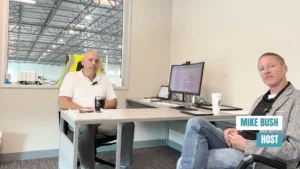One of Bauer Built Tire & Service’s principal business philosophies is safety—we promote safe work behaviors throughout the company and maintain well-organized facilities to ensure a safe working environment for our employees. This dedication to safety extends to our customer, and as such, from time to time, Bauer Built provides tips to help our customers remain safe while on the road.
A National Highway Transportation Safety Administration Crash Causation Survey found tire issues in one out of every eleven crashes.
The recommended air pressure, tread depth, alignment and regular rotation intervals are crucial to motorist safety, as well as improving driving performance and extending tire life, especially in the dog days of summer.
Hot Summer Tire Tips
Maintaining tires year-round is essential, but particularly so during the warm seasons. As temperatures rise, heat causes rubber to break down faster.
To prevent premature wear, a flat tire, or a blowout, the following are some summer tire maintenance tips that can help extend the life of your tires and keep you safely off the side of the road and out of the heat.
Air Pressure:
SaferCar.gov studies show that just 19% of consumers properly check and inflate their tires and one in four cars has at least one tire that is significantly underinflated.
Improper air pressure in tires can lead to a multitude of problems:
- Uneven, accelerated tire wear
- Structural damage
- Tire failure
- Poor gas mileage
SaferCar.gov maintains that proper inflation alone can extend the average life of a tire by 4,700 miles and save motorists up to 11 cents per gallon.
However, according to the Michelin® Truck Tire Service Manual, during the summer or winter, an increase in ambient and/or operating temperature will result in an increase in tire pressure.
- For every 10˚ increase in temperature above 65˚F, a tire’s air pressure will increase 2 pounds per square inch (PSI)
- Tire pressure should be measured monthly, before a long trip, or every 3,000 miles, including the spare, to ensure smooth driving and better gas efficiency
- In the summer, it’s recommended that tire pressure be checked at least once a week
- Tire pressure should be checked when “cold” (when the car hasn’t been driven for at least three hours); checking the tires when hot will result in elevated readings
- Tires should also be inflated when “cold” to vehicle manufacturer’s recommendations, not the maximum limit stamped on a tire sidewall
- Keep a tire pressure gauge in the vehicle in the event of a pothole or curb bump which can cause a tire to suddenly lose pressure
Tread Depth:
Tire tread provides enough traction to translate braking power into stopping power, preventing a vehicle from slipping and sliding.
It’s essential to check tire tread once a month to ensure safe driving.
- Tires have built-in treadwear indicators bars between the ribs; when tread is worn down flush with the indicator bars, it’s time to replace the tire
- A penny can also be used to check tread; if you can see the top of Lincoln’s head when a penny is slid into a tread groove with Lincoln’s head upside down and facing you, it’s time to replace the tire
- Inexpensive, easy to use and available at any auto parts store, tire depth gauges are probes that can simply be stuck into a groove and pressed against the tread block to read results
Consumer Reports recommends replacing your tire when 4/32 of an inch remains.
Alignment:
“Keeping tires balanced and aligned ensures wheels rotate properly and don’t cause the vehicle to vibrate which can damage the tire and result in a road safety hazard,” added Sam Westphall, Bauer Built Tire & Service Store Manager. “At our Eau Claire, WI, location, we have the tools to perform a free alignment check to see how your car lines up.” More importantly,
- New tires should always be balanced when installed
- Have the alignment of all four wheels checked as per the owner’s manual and after any serious pothole or curb bump
- Check your tires visually for uneven wear—typically an indicator of an alignment or inflation problem
- If you feel vibration, have the tires inspected immediately
Rotation:
Tire rotation ensures that tires wear evenly, providing for a smoother ride and safer handling.
Check the owner’s manual or ask your tire technician:
- To determine how frequently to rotate
- For the best pattern of rotation
Tires should ideally be rotated every 5,000 to 8,000 miles – or sooner if uneven wear appears.
Routine examination and maintenance of your vehicle’s tires, particularly in the hot summer months, protects drivers, passengers and other motorists, enhances vehicle performance, improves fuel mileage, and extends the life of the tires, translating to significant cost savings and optimum safety while on the road.
Visit Bauer Built today for more tips to extend your tire’s life.









